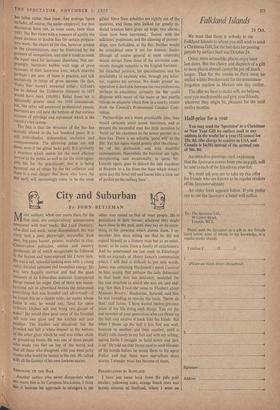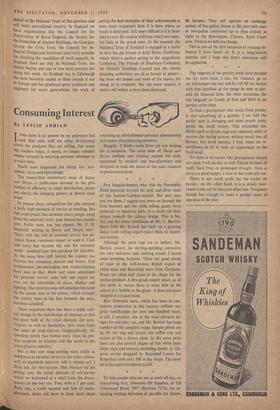City and Suburban
BETJEM AN By JOHN
MANY authors, when one meets them for the first time, are comparatively unimpressive compared with their books. But Lord Dunsany, who died last week, never disappointed. He was every inch a poet, playwright, storyteller, Irish peer, big-game hunter, painter, modeller in clay, Conservative politician, soldier and country gentleman, all of which occupations he followed In the busiest and most-enjoyed life I have seen. He was a tall, splendid-looking man with a young voice, decided opinions and boundless energy. He Was very happily married and had the good manners of an Edwardian autocrat. Unexpected things roused his anger. One of them was manu- factured salt in advertised brands (he mistrusted everything that was branded and advertised)—if he found this on a dinner table, no matter whose house it was, he would say, 'Send for some ordinary kitchen salt and bring two glasses of water.' He would then pour some of the branded salt into one glass and the kitchen salt into another. The kitchen salt dissolved, but the branded salt left a white deposit at the bottom of the other glass which he said was either chalk or ground-up bones. He was one of those people Who made you feel on top of the world and that all those who disagreed with you were petty crooks who would be beaten in the end. He talked With all the fantasy of his own J orkens stories.
THROWING UP THE BALL -• Another author who never disappoints when one meets him is Sir Compton Mackenzie. I think this is because his approach to strangers is the other way round to that of most people. He is prejudiced in their favour, whatever they might have done in the past, until they say or do some- thing in his presence which damns them. I re- member him once telling me that he did not regard himself as a literary man but as an enter- tainer, as he came from a family of entertainers. And he entertained me last week in. Edinburgh with an example. of Henry James's conversation which I will find it difficult to put into words. James was criticising Mackenzie's novel Carnival to him, saying that perhaps the lady delineated in that book was too delicately modelled for the vast structure in which she was set, and end- ing, 'but then f said the same to Flaubert about Madame Bovary.' Mackenzie, flattered, said that he was intending to rewrite the book. 'Never do that,' said James, 'I have wasted twelve precious years of my life doing such things. You are the one member of your generation who can throw up the ball and receive it back into his hands. But when I throw up the ball it hits first one wall, bounces to another and then another, until it 'finally rolls slowly to my feet and with my aching, ageing limbs I struggle to bend down and pick it up.' He told me that James used to send resumes of his novels before he wrote them to his agent Pinker and that these were marvellous short stories. I wonder what has become of them.
PRESERVATION IN SCOTLAND
I have just come back from the pale gold birches, yellowing oaks, orange beech trees and brown streams of Scotland, where I went on behalf of the National Trust of that glorious and still fairly unmutilated country. In England we have organisations like the Council for the Preservation of Rural England, the Society for the Protection of Ancient Buildings, the Georgian Group, the Civic Trust, the Council for In- dustrial Design and numerous local civic societies for checking the vandalism of local councils. In Scotland there are only its National Trust, the Saltire Society and one or two local societies for doing this work. As Scotland has in Edinburgh the most beautiful capital in these islands if not in Europe and has produced great architects and engineers for many generations, the work of saving the best examples of their achievements is even more important than it is here where so much is destroyed. Still more difficult is it in Scot- land to save the modest buildings which are essen- tial foils to the grand ones. At the moment the National Trust of Scotland is engaged in a battle to save the old houses in Kirk Street, Dunblane, which form a perfect setting to the magnificent Cathedral. The Friends of Dunblane Cathedral, the Historic Buildings Council and the county planning authorities are all in favour of preserv- ing these old houses and most of the money for doing so is available. But the town council, it seems, still wishes Jo have them destroyed.

































 Previous page
Previous page